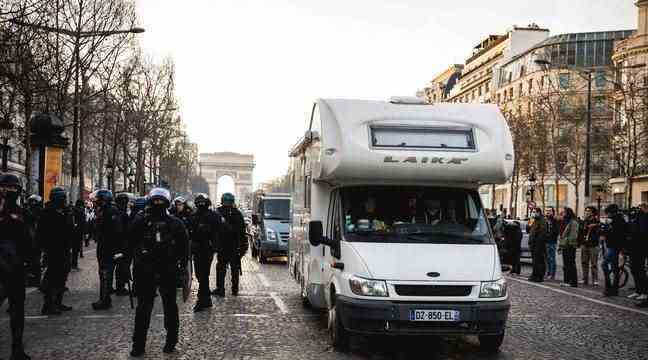A few hundred demonstrators gathered in Paris on Saturday, February 12, at the call of the self-proclaimed “freedom convoy” to denounce the health measures – in particular the vaccination pass. In the capital, the police headquarters had deployed more than 7,200 police and gendarmes to prevent convoys of vehicles and demonstrators from regrouping. Indeed, the prefect of police, Didier Lallement, had “prohibited any gathering of people or convoy of vehicles in Paris as part of the movement of” freedom convoys “” over the weekend.
In this context, several Internet users were indignant at a video posted on Twitter on Sunday February 13. Seen more than 100,000 times and relayed in particular by Alain Houpert, senator for the Côte-d’Or, it shows a policeman who records registration numbers with his telephone. “The police are taking pictures of license plates and people’s faces”, indignantly the user who relayed the sequence.
Is this a legal and authorized practice?
FAKE OFF
Contacted by 20 minutesthe police headquarters did not respond to our repeated requests about the context of this sequence and the reasons which prompted the police officer to take a photo of the license plate.
We therefore turned to the General Directorate of the National Police to find out the general rules applicable. The latter is clear: taking a picture of one or more license plates is “a full-fledged way of investigating”. “This can be part of the techniques used to trace information,” said the national police. And therefore, in this case, to identify demonstrators participating in a gathering prohibited by decree.
But how to differentiate a demonstrator claiming to be the “freedom convoy” of “tourists”, as Senator Alain Houpert puts it? “It’s the survey that determines the difference between the vehicles”, replies our interlocutor.
In the press release relating to the ban on gatherings in Paris, the police headquarters announces its intention to use “video verbalizations” and video surveillance images to identify offenders. It also recalls that the fact of “obstructing or obstructing a road open to public traffic is punishable by two years’ imprisonment and a fine of 4,500 euros”.
According to the count of the police headquarters, the police proceeded on Saturday in Paris to 97 arrests and 513 verbalizations of participants in the “freedom convoys”, according to a report released on Sunday. According to the prosecution, 81 people were still in police custody the next morning, including Jérôme Rodrigues, one of the faces of the “yellow vests” movement and active support of the anti-pass convoys.

